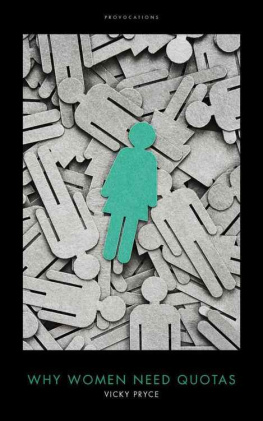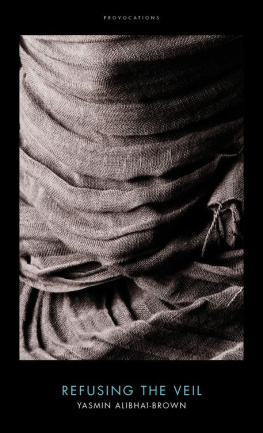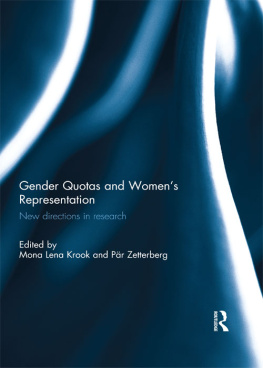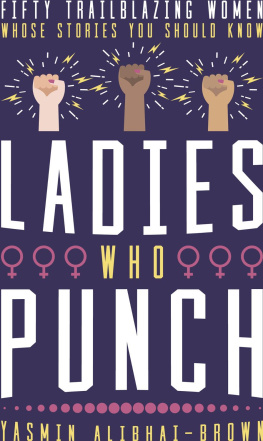My story
But weve even had a woman prime minister!
How bad can it be, really?
M RS THATCHER CAME and went. A truly significant person. But twenty-five years after her fall, and almost two years after her death, women are dissatisfied, and rightly so. We have been patient. We have been nice. We have tried persuasion . We have given businesses and organisations the benefit of the doubt.
No longer. I will argue in this book that the time has come to introduce mandatory quotas into workplaces to ensure that women can at last have a fair chance to get on. Quotas will bring an end to the terrible waste of talent, and the gross economic inefficiency, that we see today.
Some people do not like quotas. There are principled objections, which I shall consider in this essay. But you may as well know my conclusion now: they are the only way to make serious and lasting progress. In the following pages I shall set out why.
Despite having a woman as head of state, the blunt truth is that Britain is a women-unfriendly country. We are slipping behind in the world gender equality league tables despite protestations to the contrary. This year the World Economic Forum rankings of gender equal societies had us in twenty-sixth place, down from eighteenth place a year ago. This puts us behind fourteen European countries, as well as the United States, Rwanda and Nicaragua . The main reason we were pushed out of the top twenty for the first time ever was that we scored comparatively poorly in terms of pay differentials and promotion prospects with men. We also scored poorly on the numbers of women in Parliament, the government and on company boards.
This book is about economics and the dreadful waste in the labour market thanks to anti-women policy and practice by employers, to which successive governments have turned a blind eye. This book is not intended to be a whinge about how hard women find it getting a fair deal and reaching the top but instead it is meant to look at the evidence of how society is operating these days and explore why women find it hard, whether discrimination still exists and what the benefits might be if that were eliminated. It is a question of lost talent and opportunity, which costs the economy dear.
Estimates by the Equality and Human Rights Commission suggest that there are 5,400 women missing from the top jobs in the UK and that, though there has been a narrowing of the gender gap across business, politics and the media, this has been tortuously slow. Looking back over ten years shows that progress has been poor and that in some sectors we have in fact seen a slowing down and even gone backwards. That can hardly be a sustainable or desirable situation.
An unusual upbringing
I was first encouraged to think about the weirdness of women being treated differently from men while I was growing up in Greece in the late 60s. My mother, despite being a enthusiastic mathematician, was prevented by her father and five brothers from going to university to study physics. This just wasnt done. Sending a girl to spend all her time with men in university what would the neighbours think? Today we see this sort of attitude in Afghanistan and many other less developed countries, especially those where religion dominates politics. But in post-war Europe not so long ago, similar attitudes prevailed. This was especially true in countries where religious beliefs were strongly held. Until all faiths allow women the same right to be preachers and priests or imams, women will always be held back.
So instead, thwarted by her family, my mother, this very clever but frustrated woman, pursued other interests. She was the best electrician and mechanic anyone ever met. She fixed everything in our house and those of myriad relatives. This was an unpaid hobby. She also became an expert poker player, financing all her expenses and many of ours through her gains over the years. She rode a motorbike, wore leather jackets, smoked while my father wasnt watching and was wonderfully unconventional for her time. She also believed in all of us, her son and daughters, having similar opportunities, and though Greece was still a very prudish country, she had no problem with us mixing freely with members of the other sex. She commandeered a spot next to our summer house and turned it into a volleyball ground where everyone from the neighbourhood would get together and play every afternoon and so it was that my younger sister became a professional with the top volleyball team in Greece and was on the national team for years thereafter.
But mixing with boys was so frowned upon by the rest of our enormous family of uncles and aunts and many cousins (my father was one of ten, my mother one of seven) that my female cousins were forbidden to come and stay with us because there were boys around. Boys? I used to think. What is so special about them? And if boys can go wherever they want, why cant girls? Interestingly, this freedom was not extended to all aspects of our lives. My father was concerned, when I was in my early teens, that I would be seen by neighbours going out with boys on my own, even though I was in a mixed school. Appearances had to be kept up.
However, in this mix of confused values it was perfectly OK to go out partying from a very young age as long as my brother was with me! So my brother and I perfected a solution. His friends liked to really party; my friends, who in fact were his own schoolmates , liked more sober pastimes classical music and chess. We would therefore get ready to leave together, say our goodbyes to our parents, exit the house and, after a few hundred yards, separate and go our own way. We would then meet, each agree on a story and return home together. It worked a treat, but it infuriated me deep down: why were women so restricted and not men? And why did my brother, useless as far as I was concerned, who never did any work at school and got away with it, automatically have such a right that I had to fight for? It was incomprehensible to me. Perhaps this was the first stirring of feminism inside a young Greek girl.
Educating Vicky
My parents were, however, very keen on our education. My mother forbade us all from playing the piano as it was a waste of time. She had learned to play it as a young girl, she would often tell us, and see where it got me. Nowhere! Instead, she taught us all maths and insisted that the time we would spend playing the piano could be more usefully spent learning languages. In retrospect I suspect we could have done both but she was adamant, although there was a piano in the house. We all learned more than one language. We learned French as toddlers and my brother and sister went to the American schools for boys and girls respectively.
I was sent to the German School of Athens. I count my blessings to this day. I was the only one who finished school early enough to have exclusive lunch with my parents every day, dictating in the morning what I wanted to eat. This private audience allowed me to increasingly brainwash my parents about women and their rights; they were gradually capitulating in relation to women in society and becoming even more liberal in their attitudes than before. The German School was a mixed school where girls were in a minority. That helped me hugely. I went into the science stream for the last couple of years, one of the few girls to do so, as I was useless at classics. My best friends were boys. But no real distractions were allowed as my parents would have felt let down if I didnt perform. It was a great incentive to forget your gender and just get on with studying.














